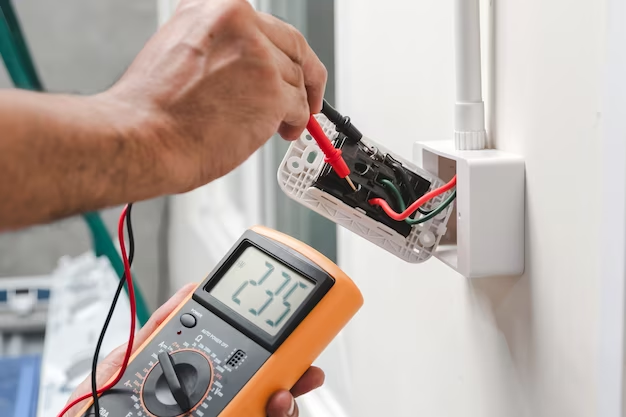When it comes to electricity there is no safe time of year. Any short in your electrical issues can result in a fire which will cause significant damage to your home and possessions.
Of course, that’s not the only risk associated with electricity. A badly wired circuit can give you a nasty shock, in some cases this is enough to kill you. That’s why it’s imperative that you become aware of electrical hazards and the tips that can literally save your life. By taking reasonable precautions you should never have an issue with fire or any other electric-related incident.
Inspection
The most important preventative step is to find yourself a reputable and qualified electrician. You can then arrange for them to make an annual visit to inspect your home. During an annual report an electrician will evaluate your current electrical wiring system, locate short-circuits and even find leakage that is increasing the cost of your electrical usage every year.
When you’re home all the time it’s easy not to notice small issues. You become accustomed to a whirring noise or buzzing. But, a qualified electrician will notice these and will investigate further. This ensures your safety is not placed at risk.
The best thing is to book an inspection today and then book another one for in one year. This will ensure you don’t miss an appointment.
Visual Checks
A check that you can do yourself weekly or monthly is for loose sockets. These may look normal, but, if they lose it is possible for anyone to accidentally pull the socket out of the wall when unplugging something.
This can result in a brush with the live cables or the shorting of a circuit. Neither of these is desirable options.
Don’t forget, if you have children all accessible sockets should have safety covers to stop the children from sticking their fingers where they shouldn’t.
It’s also a good idea to visually inspect all appliances, especially those that are used on a regular basis. If there are any signs of frayed power cords you should stop using the appliance and replace the cable. It is generally best to replace the entire cable.
Unplug
If you leave a charger plugged in once the product has been charged or when the product is not plugged in, you’ll find that the charger still draws current from the mains. The amount is small but when multiplied by numerous chargers and the amount of time they spend plugged in, you’ll find it can make a significant difference to your electricity bill.
Potentially more important is the potential for overload. Most radial circuits are only designed to handle eight appliances plugged in at the same time, assuming the appliances are relatively low powered.
If you have a heavy draw on your system, especially an overloaded socket, you’ll find there is too much electricity going down one circuit. This will cause it to overheat, melting the protective casing and allowing the wires to touch together. The resulting spark can easily start a fire.
Check Circuit Breakers
The circuit breakers are mounted in your fuse box and allow electricity to flow into circuits. If the circuit is unbalanced the breaker will turn off, shutting off the power to the faulty circuit. This reduces the likelihood of fires or personal electric shocks.
You should visually inspect and test all the breakers regularly to ensure they are doing their job properly. They really are life-savers.
Look At Light Bulbs
Light bulbs are essential to see what you’re doing in the darker hours. But, did you realize that every light bulb holder has a rating? This will tell you the type of bulb required and the maximum wattage it can handle. Make sure you don’t put any bulb in with a wattage higher than recommended. This can cause it to overheat and explode and cause a fire.
Smoke Detectors
These are often overlooked when it comes to safety at home but they really can save lives. You should have at least one smoke detector per level of your home. These should be tested weekly and positioned to go off when a fire starts.
Alongside the smoke alarm you should consider adding carbon monoxide detectors to your home. This lethal gas is virtually undetectable to the human senses but is deadly. The carbon monoxide detector, which should be a maximum of 15 feet from your bedroom, can warn you of the issue.
If this happens the best idea is to open the windows wide. This will dilute the polluted air, keeping you safe while you locate and fix the issue.
Cord Placement
Even when you design your own home you’ll find that there never seems to be quite enough sockets or they are not in the right places. The result is extension cables are run across your home. Unfortunately, these become trip hazards and there is a risk of them being damaged, causing live wire exposure. That can result in a nasty electric shock.
If extension cables need to be used make sure they are clipped to the walls with approved clips or in trunking. This will help to ensure they are safe.
Be Aware Of Issues
There are several signs that you have an electrical problem, even if everything seems to be functioning properly.
The most obvious is a breaker that keeps tripping. This indicates a fault or overload in a circuit. You’ll need to inspect the circuit and test it to see if it is faulty or if it’s the appliance. Appliances that have developed faults should be unplugged and removed until they can be fixed or replaced.
Other common signs that you have an electrical issue include flickering lights, sparks when plugging or unplugging an item, burn marks around a socket, or even the smell of electrical burning.
If something doesn’t seem right in your home shut the power off and check the issue. It really is better to be safe than sorry.
Regulations
Some electrical work you can undertake yourself at home. However, this doesn’t mean that you have to. The experts are likely to complete the work faster and to a higher standard than you.
Other electrical works, specifically work in bathrooms and kitchens, where water is also present, are likely to need to be completed by a qualified electrician.
It’s essential to be aware of the current regulations and act accordingly. Water and electricity don’t mix well, that’s why electrical sockets and appliances need to be a set distance apart. Knowing the regulations will help to ensure you and your home stay safe.
Earthing or Grounding
All homes should have an earth cable that runs from socket to socket and connects either back to the main supply or to a rod hammered into the ground. This is the earthing point and takes currents away from the home, potentially protecting you from a nasty shock.
Older homes often don’t have an earthing point which leaves you at greater risk of an electric shock. Have your electrics inspected and add a suitable earthing rod if necessary.
It’s worth noting that you may able to connect an earth to the main grid, but this is not always the case. Creating your own earthing rod ensures you have better safety and protection from electrical faults.
Working At Heights
When you’re working with electricity you may find that you need to climb up ladders or even into loft spaces. As you won’t know what you are dealing with it is essential that you proceed with caution. The safest way to tackle electrical cable tracing, potential issues, or even some simple rewiring, is to shut the power off at the main breaker first.
This will allow you to safely trace cables and make mistakes without electrocuting yourself. Don’t forget, if you receive an electric shock while up a ladder you can be thrown across the room. This will potentially create another array of issues for you.
Circuit Breakers
You already know that a constantly tripping circuit breaker means here is a fault with the circuit or the breaker. But, you should also be aware that circuit breakers save lives. Check your fuse board and make sure you have modern breakers that will trip in less than a second if a problem is detected.
You should also consider Ground Fault Circuit Interrupters for areas of your home that have water, such as the kitchen and bathroom.
Of course, every circuit breaker should be rated for the circuit it’s controlling. If you’re not sure whether yours are or not get the electrician to check for you. If the circuit breaker is too high it may not trip when you need it to.
The key to electrical safety is to be vigilant at all times and to know your limits. It’s not a failure to get professional help.







